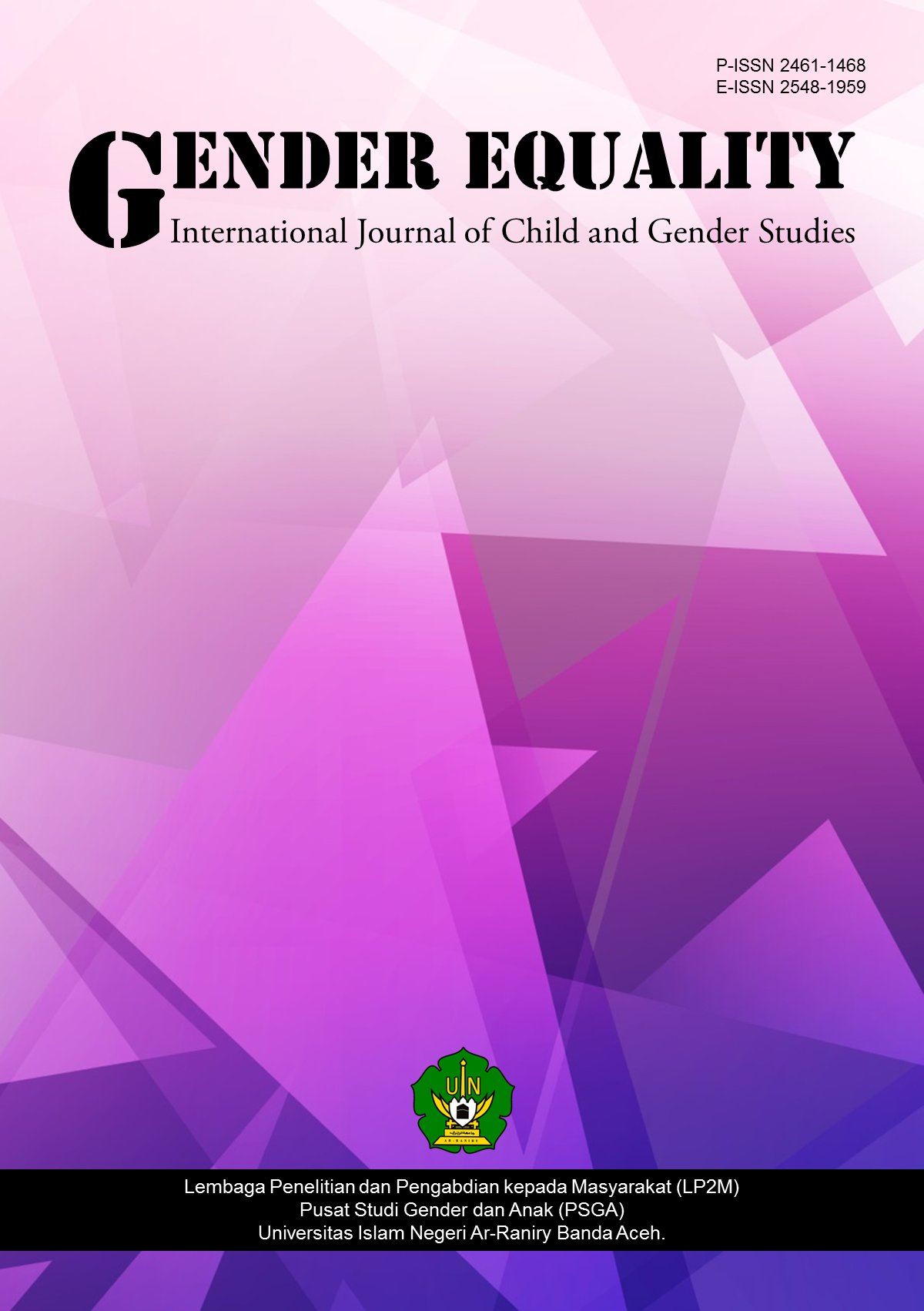Empowering family resilience: Muslim women’s impact in Perbaungan
DOI:
https://doi.org/10.22373/equality.v10i2.25958Keywords:
Dual Roles, Economic Resilience, Empowerment, Family Economy, Islamic Values, WomenAbstract
This study aimed to explore the contributions of women in Melati I Village, Perbaungan District, who engage in trade to support their family economy. The objective was to examine how these women manage the dual roles of working while maintaining their household responsibilities. A qualitative research methodology was employed, with data collected through semi-structured interviews involving five respondents. The findings indicated that women worked for a variety of reasons, including self-development, social engagement, and economic necessity. Their participation in work had a positive impact on the family's financial stability, but also posed challenges, particularly in balancing time between work, family, and community obligations. The study revealed that despite the difficulties, women were able to manage these dual roles through strategies such as open communication with their husbands, maintaining a balance between their domestic and public responsibilities, and ensuring that their work aligned with Islamic values, which emphasize the preservation of their honor and fulfillment of household duties. The research concluded that with the right strategies, women could make significant contributions to the family economy without compromising family relationships or societal values. These findings underscore the importance of further empowering women in the family economy to enhance their potential in strengthening family economic resilience.References
Afrizal, S., Legiani, W. H., & Rahmawati. (2020). Peran perempuan dalam upaya meningkatkan ketahanan ekonomi keluarga pada kondisi pandemi COVID-19. Untirta Civic Education Journal, 5(2), 149–162. https://jurnal.untirta.ac.id/index.php/UCEJ/article/view/10510
Alfiah, A., Mustakim, M., Naskah, N., Nuryanti, N., & Salmiah, S. (2020). Kontribusi perempuan terhadap ketahanan keluarga pada masyarakat nelayan pesisir Pantai Bengkalis. Marwah: Jurnal Perempuan, Agama dan Jender, 19(1), 92. https://doi.org/10.24014/marwah.v19i1.9633
Alie, A., & Elanda, Y. (2020). Perempuan dan ketahanan ekonomi keluarga (Studi di Kampung Kue Rungkut Surabaya). Journal of Urban Sociology, 2(2), 31. https://doi.org/10.30742/jus.v2i2.995
Apriliani, R. (2024). Literasi keuangan berbasis teknologi digital (1st ed.). CV. Literasi Nusantara Abadi.
Atika. (2023). Performance analysis of sharia banking using the education prism method: Case study PT. Bank Muammalat Sumatera Utara. Edukasi Islami: Jurnal Pendidikan Islam, 12, 773–784. https://doi.org/10.30868/ei.v12i01.4264
Baqutayan, S. M. S. (2016). The entrepreneurial characteristics of successful entrepreneurs: Effective psychological model from Holy Quran and Islamic history. Journal of Accounting and Economics, 2(1), 50–59. https://api.semanticscholar.org/CorpusID:220524838
Damayanti, A., & Rokamah, R. (2023). Peran perempuan pengrajin batik Sariwarni Kabupaten Madiun dalam pengembangan ekonomi kreatif ditinjau dari perspektif ekonomi Islam. AL-ITTIFAQ Jurnal Ekonomi Syariah, 3(2), 12. https://doi.org/10.31958/al-ittifaq.v3i2.9497
Fatma, R., Ridho, T. K., Najib, M., Witarto, A. B., Zulkieflimansyah, & Zain, I. (2020). Analisis peran ganda dan lingkungan kerja terhadap kinerja dosen perempuan di Kabupaten Sumbawa. Equilibrium: Jurnal Pendidikan, 8(2), 181–192. https://doi.org/10.26618/equilibrium.v8i2.3386
Handayani, T., & Nurwahidin, D. A. M. (2023). Kontribusi laki-laki dan perempuan dalam ekonomi keluarga perspektif Islam. Jurnal Ilmiah Ekonomi Islam, 9(01), 1071–1079. http://dx.doi.org/10.29040/jiei.v9i1.7635
Hasyim, F., Indriani, Y., & Sayekti, W. D. (2022). Analysis of gender roles in agro-industrial workers’ families. Gender Equality: International Journal of Child and Gender Studies, 8(2), 238. https://doi.org/10.22373/equality.v8i2.14710
Holijah. (2019). Konflik peran ganda wanita terhadap ketahanan ekonomi keluarga. Al-Ahwal, 12(1), 56–64. https://doi.org/10.14421/ahwal.2019.12105
Imsar, I., Nasution, J., & Fattah, M. A. (2022). Analysis of tempe production micro business strategy in increasing income in the Covid-19 pandemic using SOAR analysis. Jurnal Ekonomi, 11(02), 1662–1667. https://ejournal.seaninstitute.or.id/index.php/Ekonomi/article/view/2622
Lutfi, M., & Safitri. (2020). Strategi ekonomi Islam dalam membangun ketahanan ekonomi keluarga Muslim. Syar’ie: Jurnal Pemikiran Ekonomi Islam, 3(2), 186–197. https://stai-binamadani.e-journal.id/Syarie/article/view/203
Muhibuddin. (2020). Pandangan ulama dayah terhadap perempuan pekerja pada malam hari pada fasilitas umum (Studi penelitian di Kabupaten Bireun). Gender Equality: International Journal of Child and Gender Studies, 6(1), 95–108. https://jurnal.ar-raniry.ac.id/index.php/equality/article/view/4485/2947
Nasution, Y. S. J., & Rahmi Syahriza, R. M. (2020). Analisis partisipasi tenaga kerja perempuan dalam pemenuhan kesejahteraan keluarga di PTKIN SE Sumatera. Kafaah Journal of Gender Studies, 10(2), 1. http://kafaah.org/index.php/kafaah/index
Rizkia, F. N. (2018). Peran perempuan dalam meningkatkan perekonomian keluarga melalui program P2WKSS di Sumber Gamol, Balecatur, Gamping, Sleman. Social Studies, 3(2), 406–418. http://library.fis.uny.ac.id/elibfis
Rochmadi, I. (2022). Analisis ketahanan ekonomi keluarga pasca pembangunan pasar ekologis Argowijil. Jurnal Ilmu Administrasi, 11(1), 1–12. http://journal.stia-aan.ac.id/index.php/PRDM/article/view/135
Septrilia, M., Sriati, S., & Husin, A. (2024). Analisis ketahanan ekonomi keluarga pada pelaku pernikahan usia dini di Desa Pengaringan Pagaralam Sumatera Selatan. Comm-Edu, 7(1), 2615–1480.
Siregar, I. P. (2021). Ketahanan ekonomi keluarga dan perempuan. Journal of Gender and Social Inclusion in Muslim Societies, 2(2), 68–83.
Downloads
Published
Issue
Section
License
GENDER EQUALITY: International Journal of Child and Gender Studies allows the author(s) to hold the copyright and to retain the publishing rights without restrictions. Authors who publish with this journal agree to the following terms:
- Authors retain copyright and grant the journal right of first publication with the work simultaneously licensed under a Creative Commons Attribution License that allows others to share the work with an acknowledgment of the work's authorship and initial publication in this journal.
- Authors are able to enter into separate, additional contractual arrangements for the non-exclusive distribution of the journal's published version of the work (e.g., post it to an institutional repository or publish it in a book), with an acknowledgment of its initial publication in this journal.
- Authors are permitted and encouraged to post their work online (e.g., in institutional repositories or on their website) prior to and during the submission process, as it can lead to productive exchanges, as well as earlier and greater citation of published work.



